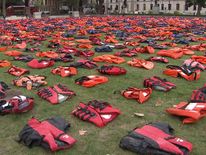The UK has the right to control its borders and turn away "economic migrants" who pose as refugees to gain entry, Theresa May will tell world leaders.
The Prime Minister will say at the UN summit that refugees should claim asylum in the first safe country they come to in order to address "unprecedented levels of population movement" around the world.
Mrs May will offer a three-point strategy to tackle the migrant crisis and warn leaders the problem must be addressed to ensure "public confidence in the economic benefits of legal and controlled migration".
Speaking at the summit in New York where leaders are gathered to address the problem, Mrs May outlined her three principles as:
:: Refugees should claim asylum in the first safe country they reach - rather than travelling onwards
:: Better distinctions should be drawn between refugees and "economic migrants"
:: Countries should have a right to control their own borders.
Ahead of the summit, Mrs May said: "Across the world today, we are seeing unprecedented levels of population movement and we need to work together to find a better response, which focuses our humanitarian efforts on those refugees in desperate need of protection and maintains public confidence in the economic benefits of legal and controlled migration.
"This is an urgent matter - more people are displaced than at any point in modern history and it is vital that we provide ongoing support for those people most in need of protection."
The Prime Minister said the UK would "step up our efforts with further financial assistance and concrete action plan" working with the countries most affected.
She added: "But we cannot simply focus on treating the symptoms of this crisis, we need to address its root causes too."
However, an international lawyer has warned Mrs May's plans to distinguish between refugees and "economic migrants" would be "almost impossible" to achieve.
Philippe Sands QC, a professor of international law at University College London, said she would need to push for reform of the 1951 UN Convention for the changes to apply.
It comes after the former foreign secretary, David Miliband, now president of the International Rescue Committee, said that the UK should take four times as many refugees as currently planned.
Refugee Council chief executive Maurice Wren was highly critical of Mrs May's plans saying the proposals indicated Mrs May wanted to "reinforce the untenable status quo".
To draw attention to the plight of refugees and migrants, refugees and charities have created a "lifejacket graveyard" in Parliament Square.
They have laid out 2,500 lifejackets worn by migrants - including 625 used by children - as they attempted dangerous crossings to safer countries.
The UN estimates on average 11 men, women and children have died across Europe every day in the last year trying to make the crossings.
Some 57,000 migrants are said to be trapped in Greece in 47 camps because some European countries have closed their borders.




